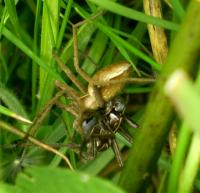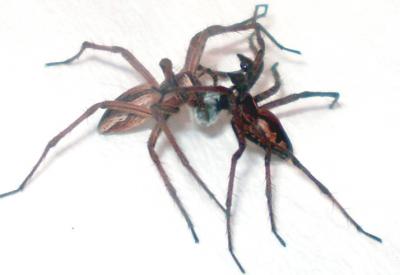How very pleasant. Female spiders, not only famous for killing and eating their hapless male counterparts after sexual congress, also demand payment for the pleasure. The better the present, the better the service.
 Male nursery web spiders (Pisaura mirabilis) prepare silk-wrapped gifts to give to potential mates. Most gifts contain insects, but some gifts are inedible plant seeds or empty exoskeletons left after the prey has already been eaten (presumably by the male himself!). Males will also 'play dead' if a female moves away and then attempt to re-establish mating. New research published in BioMed Central's open access journal BMC Evolutionary Biology examines the reproductive success of deceitful males and shows that females are not impressed by worthless gifts.
Male nursery web spiders (Pisaura mirabilis) prepare silk-wrapped gifts to give to potential mates. Most gifts contain insects, but some gifts are inedible plant seeds or empty exoskeletons left after the prey has already been eaten (presumably by the male himself!). Males will also 'play dead' if a female moves away and then attempt to re-establish mating. New research published in BioMed Central's open access journal BMC Evolutionary Biology examines the reproductive success of deceitful males and shows that females are not impressed by worthless gifts.
 Male spiders were provided with either a potential gift of a fly, or a worthless item, such as a cotton wool ball, a dry flower head, a prey leftover (previously eaten housefly), or no gift at all. All the gifts were approximately the same size, so the females would not be able to tell what the gift was without unwrapping it. Males that offered any gift were more likely to successfully mate than males without. However the length of time the females allowed males with worthless gifts to spend transferring sperm was shorter than those with edible gifts (and even shorter for those with no gift at all!).
Male spiders were provided with either a potential gift of a fly, or a worthless item, such as a cotton wool ball, a dry flower head, a prey leftover (previously eaten housefly), or no gift at all. All the gifts were approximately the same size, so the females would not be able to tell what the gift was without unwrapping it. Males that offered any gift were more likely to successfully mate than males without. However the length of time the females allowed males with worthless gifts to spend transferring sperm was shorter than those with edible gifts (and even shorter for those with no gift at all!).
It appears that both male and female spiders are apparently able to assess the value of the gift and modify their behavior accordingly. Not only did the female spiders end mating sooner with an inedible gift, but male death feigning (thanatosis), which is triggered by the female attempting to end mating and run away with the gift, occurred in half of the matings involving an edible gift, but only once with a worthless gift. Similarly males and females were sometimes seen fighting over edible gifts, but never for a worthless gift.
Maria Albo who led the research explained, "The evolution of male deceit involves a complex equation of costs and benefits. It costs the males to find and wrap a gift, but these costs can be reduced if the male does not have to first catch his gift, or gives one that has already been eaten. The benefit of the gift is longer mating, which leads to more sperm being transferred, and potentially a higher number of offspring. However, the females are wise to deception and terminate mating early for worthless gifts."
She continued, "The final results show that the number of eggs hatching was lower if the female had not received a gift, but there was little difference between females who had received an edible or inedible gift. The success of cheating probably explains why both strategies have co-evolved and are maintained in the population."
Souce:http://biomedcentral.com

The aim of art is to represent not the outward appearance of things, but their inward significance. – Aristotle


















